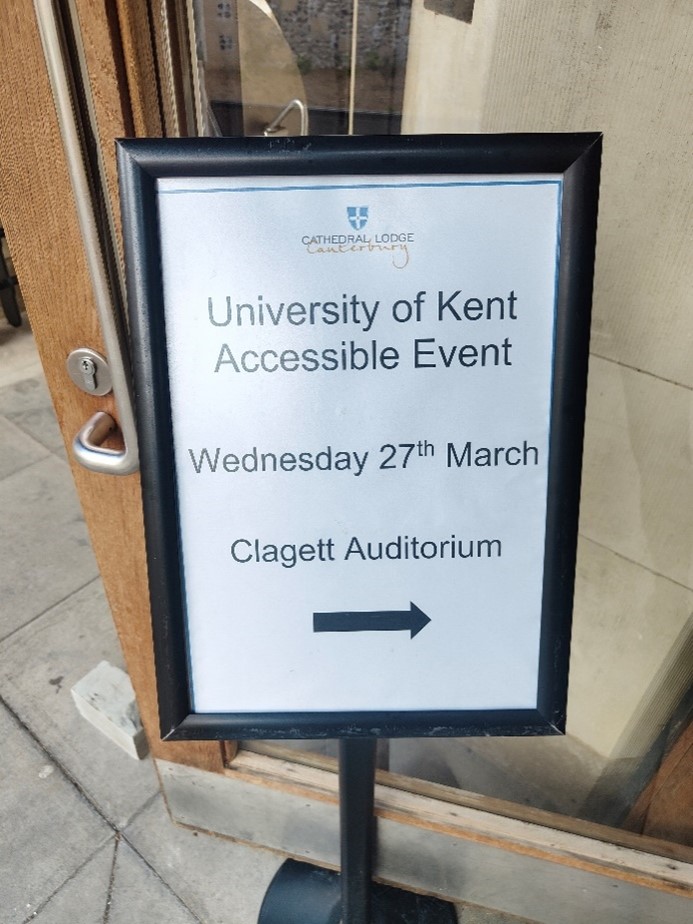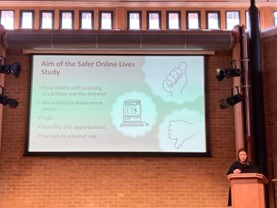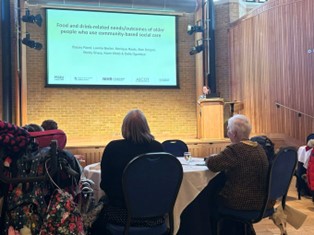October 1, 2024
By Sarah Birch, Karen Jones, Margaret Ogden
With contribution and review from our Research Advisors
 Introduction:
Introduction:
Members of the public were invited to attend an event to hear about research findings from a selection of projects funded through the National Institute Health and Care Research (NIHR) School for Social Care Research (SSCR).
The event was designed by researchers and research advisors, for colleagues from the Tizard Centre, Centre for Health Service Studies and the Personal Social Services Research Unit to present their research findings. In addition, the event was designed for researchers to listen to the attendees about their views of the research findings and what other research ideas and methodologies researchers should consider in the future.
The team wanted to engage with a variety of people, outside of academia, who may not otherwise attend a research event. It was important that this event was planned to ensure inclusivity and accessibility for all delegates.
Help with the event planning – Listening to our research advisors:
To ensure the event was designed with accessibility and inclusivity considerations, colleagues at the University of Kent consulted with five research advisors during the event planning stages. Our research advisors represent people who use social care or health care, or support others in their health and care needs. They also have knowledge of attending various events, and some have experience of accessibility requirements needed for such events.
The research advisors were consulted on three main themes:
1. How to publicise the research event to people interested in Health and Social Care research.
Our research advisors reviewed the first draft of an event flyer, which would be subsequently emailed to potential delegates. Our research advisors suggested significant changes to the wording, colour and layout to make the flyer more visually appealing and accessible to delegates. For example, our research advisors were keen to ensure the accessibility phrasing was accurate, as this can be a key consideration for people attending an in-person event. We started with the following wording suggestion:
‘We will ensure full delegate accessibility – let us know your accessibility needs.’
Following advice from our research advisors, we then reworded this statement to:
‘The venue is wheelchair accessible (including a standard accessible toilet). Please let us know if you have any access and support requirements.’
Our research advisors also helped with distributing the event details to their networks and contacts, which was hugely beneficial in spreading the information about the event to anyone outside of the normal academic networks. We circulated this event to our public research advisor networks associated with the University of Kent. Our colleagues and research advisors also distributed the event flyer to their networks or to specific people they knew would be interested in the event.
2. How to make sure the research event was accessible to all.
Our team of research advisors helped advise researchers on the organisation of the event registration. We decided to use a single point of contact, using phone or email, for registration for the event, instead of an online registration page. This meant potential delegates had the opportunity to ask any questions about the event, and allowed our organiser to find out any specific accessibility or dietary requirements for the day.
Our research advisors gave us helpful information regarding accessibility considerations, for example, making sure wheelchair users can access the food and drink tables and ensuring we provided clear directions to the venue.
Our research advisors also reviewed the presentations before the event to make sure any acronyms, language, content and format were clear to a non-academic audience, for example ensuring the term ‘grey literature’ – a term to describe material and information that is not produced by commercial publishers e.g. conference notes, blogs, working papers – was clearly explained during the presentation.
We did not have any requests for supporting deaf or blind delegates, delegates needing a translator, or delegates needing personal assistants or carers, but we had the budget available to support these requests if needed.
3. How to organise the event to ensure all voices are heard.
Our team of research advisors suggested that we should include wording on our advertising flyer, such as ‘have your say’ or ‘we will listen’ to demonstrate to potential delegates that the event placed importance in listening to people’s views on the research findings, and gathering their ideas for future research ideas.
The research presentations:
The agenda was wide-ranging, encompassing a range of projects funded by the NIHR School of Social Care Research Round 3. This included projects from the Tizard Centre, the Centre for Health Service Studies and the Personal Social Services Research Unit at the University of Kent:
- Safer Online Lives: This project focused on the use of the internet and social media by people with intellectual and developmental disabilities – risks and interventions (Paraskevi Triantafyllopoulou). Website Link.

- Understanding and supporting older people’s ‘transition’ between different care settings: co-production of practice guidance for social care practitioners (Wenjing Zhang). Website Link.
- Food and drink-related needs and outcomes of older people who use community-based social care (Stacey Rand). Website Link.

- Care relationships between support staff and adults with a learning (intellectual) disability in long-term social care residential settings in England (PhD project – Georgios Mamolis)
All our presentations sparked a keen interest and discussion amongst our delegates and also allowed for new project ideas to be discussed. Some of the research advisors involved in the projects were present at the event and were able to talk about their experiences of being part of the research team. Research advisors working with Wenjing Zhang spoke about how much they were listened to during the project and how they ‘jumped for joy’ when they heard about this research area which had felt ‘long overdue’. They spoke about how they saw the transition between different care settings being similar to a train journey, and we saw how this idea was subsequently translated into the production of an animation video. One research advisor spoke very passionately about what it means to them to see their contribution and name acknowledged and associated in the research.
Learnings from the event:
Overall, the event was a great success with positive feedback from our delegates. It was a pleasure to meet with people outside of the University setting, especially with people with experience or personal reflections of their health and social care situations. Our delegates were pleased this was an in-person event, as they sometimes find the technology challenging for online meetings. For the future, we could consider organising both an in-person meeting, and then replicate as an online meeting to allow full inclusivity and accessibility.
Our team had a very short timeframe from budget approval to event day, which meant a short lead time for potential delegates to organise travel and carer replacement if needed. We are very keen to replicate a similar event at a later date during future research events. Therefore next time, we will ensure there is more time for people to arrange for their personal assistants or carers to accompany them to the event. We look forward to the opportunity to host a further accessible research event in the future!
Acknowledgement
The event included presentations that summarised independent research funded by the National Institute for Health and Care Research School for Social Care Research (NIHR SSCR). The views expressed are those of the authors and not necessarily those of the NIHR SSCR, the NIHR or the Department of Health and Social Care.